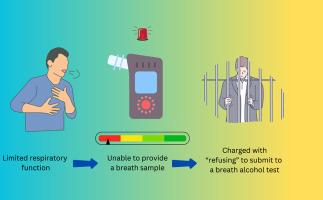Small samples, big problems—the inability to provide a sample in breath alcohol testing: Case reports
Q1 Social Sciences
引用次数: 0
Abstract
Breath alcohol testing is a cornerstone of impaired driving investigations, yet some individuals are physiologically unable to provide adequate breath samples, leading to charges of refusal despite efforts to comply. This paper presents seven case reports of individuals who failed to meet the minimum volume requirements of the DataMaster DMT breath alcohol analyzer due to factors such as age, gender, respiratory conditions, and smoking history. Despite seemingly genuine attempts to provide valid samples, these individuals were charged with refusing to submit to a chemical test.
The case reports in this paper highlight the vulnerabilities in current testing protocols, including the one-size-fits-all volume requirement, equipment problems, measurement uncertainty, individual anxiety, operator bias, and lack of transparency. Proposed improvements include alternative testing methods (e.g., blood or urine), individualized volume requirements, enhanced operator training, slope-based sampling, changes in equipment design, regular volume calibration, mandatory data collection, and independent scientific review.

小样本,大问题--呼气酒精测试中无法提供样本:案例报告
呼气酒精测试是调查酒后驾驶的基础,但有些人在生理上无法提供足够的呼气样本,导致尽管努力遵守,但仍被指控拒绝。本文介绍了由于年龄、性别、呼吸条件和吸烟史等因素而未能满足DataMaster DMT呼气酒精分析仪最低容量要求的7例病例报告。尽管这些人似乎真诚地试图提供有效的样品,但他们被指控拒绝接受化学测试。本文中的案例报告强调了当前测试协议中的漏洞,包括一刀切的体积要求、设备问题、测量不确定性、个人焦虑、操作员偏见和缺乏透明度。建议的改进包括替代测试方法(如血液或尿液)、个性化的体积要求、加强操作员培训、基于斜坡的采样、设备设计的变化、定期体积校准、强制性数据收集和独立的科学审查。
本文章由计算机程序翻译,如有差异,请以英文原文为准。
求助全文
约1分钟内获得全文
求助全文
来源期刊

Forensic Science International: Synergy
Social Sciences-Law
CiteScore
4.90
自引率
0.00%
发文量
75
审稿时长
90 days
 求助内容:
求助内容: 应助结果提醒方式:
应助结果提醒方式:


